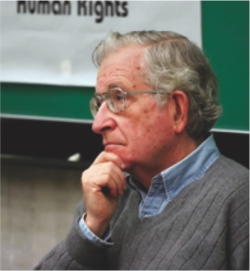| Home - Back Issues - The Team - Contact Us |
 |
| Volume 10 |Issue 29 | July 29, 2011 | |
|
|
Personality The Chomsky Phenomenon Akram Hosen Mamun
In Poland, some people believed that there were two Noam Chomskys. They assumed that one was the great linguist and the other was the widely known political dissenter. They could not conceive the notion that one person was both . The extent of Chomsky's recognition in the domains of linguistics and politics explains why the Polish people made that mistake. Journalists and biographers have always wanted to draw a link between his linguistic theories and his political views. When asked, Chomsky says, “I'd be very pleased to tell you if I knew it myself.” Chomsky's theory of generative grammar and a human language faculty revolutionised and transformed the scholarship of linguistics and evolutionary psychology in the early 60s . Chomsky's observation that serves as the backbone of modern linguistics is, to put it very simply, that humans, unlike other animals, possess an “innate” ability to learn, understand and produce language. He called this mental ability a “language acquisition device” that gives human infants the ability to acquire language. He also asserted that there are some common grammatical rules that lay the structural basis of all languages. These set of grammatical rules are what he calls “universal grammar” . These views have swept over the fields of education, sociology, philosophy, literary criticism and logic. Not even students of computer science can graduate without encountering the works of Chomsky. He is among the eighth most quoted authors in the history of American academic journals. Dr Lila Gleitman, professor of psychology and linguistics, commented in 2001 that 'for the last 40 years', studying and researching in the field of linguistics and cognitive psychology had become 'a matter of agreeing or disagreeing with Chomsky – contributing to [his] program, or trying to contribute from a slightly different perspective'. Although heavily contested and, sometimes, studiously ignored, Chomsky's critique of the role of mass media in Manufacturing Consent: The Political Economy of the Mass Media is taught in the departments of journalism in universities around the world. In this revealing study, Chomsky and his co-author Edward S Herman analysed news media as business organisations seeking profit. Anyone looking at the book will readily understand that the amount of evidence that Chomsky and Herman put forth to make their point is more than just enough. About Chomsky's analysis of the mass media, noted author Arundhati Roy commented: “He takes us on a tour through… the dizzying maze of corridors that connects the government, big business, and the business of managing public opinion.” And about the scale of facts and sources that Chomsky cites Roy wrote:
Much of Chomsky's political writings demonstrate how public opinion is constructed in the context of free-market economy by the corporate media. And his works have influenced a diverse range of people: from literary critic Edward Said, to American rock band Pearl Jam, to the president of Venezuela, Hugo Chavez, to countless academics and researchers around the world. Born in 1928, Chomsky has been writing highly critical political analysis for more than seven decades. His first article published in the editorial of a school paper was a lament for the fall of Barcelona and the rise of fascism in 1939. And that was when he was about 11 years old. However, since the early 1960s, he has been a leading opponent of American aggression, war crimes and mass murder (as opposed to 'strategic missteps') in Vietnam, East Timor, Iraq, Palestine, Afghanistan, Central America and the escalation of wars under Obama administration and many other issues that it is simply inconvenient to name all of them here. He has been working exhaustively for world peace and its related issues for more than 50 years. Still, the incessant outpouring of his writings, and the frequent interviews prove that age has failed to make its mark upon his ever critical mind and has hardly succeeded in slowing him down. A crucial characteristic of Chomsky's radical position, as indicated by James Peck, is that his works do not fit into any critical school or intellectual tradition: for his anti-Leninist, anti-Bolshevik stance, even his linguistic theories were under total ban in the Soviet bloc while his relentless criticism of Western dominance around the world made him deeply unpopular in his own country. New York Time's statement that often appears on Chomsky's publisher's blurb is: “Judged in terms of the power, range, novelty, and influence of his thought, Noam Chomsky is arguably the most important intellectual alive today”. However, Chomsky always focuses on the next line that said: “Since that's the case, how can he write such terrible things about American foreign policy?” An often cited example of how hysterically he is abused by the conservatives and liberals is the talk show where William F Buckley, the host threatened to punch Chomsky in the face . There can hardly be any doubt that his works need to be represented outside the English speaking world so that intellectuals, activists and resistance movements around the world can benefit from the insight of one of the greatest minds of our time. His works have been translated into many languages including Bengali. However, anyone translating Chomsky's writings into Bengali is sure to appreciate the voluminous translations by A Al-Mamun who translated Chomsky's masterpiece, Manufacturing Consent: the Political Economy of the Mass Media into the Bengali. I believe it does not take long for anyone to understand how much scholarly work went into Mamun's translation of Manufacturing Consent, titled, Sommoti Utpadon . For one thing, the book is quite massive and required a lot of time to translate. For another, Mamun paid as much attention to retain the structural and rhetorical elements of the source text as was necessary to make a faithful rendering. However, people who have read the translation find that Mamun was too literal in a considerable proportion of the book, making the language unidiomatic and sometimes less readable. There are also the occasional appearances of translations of Chomsky's articles in the op-ed pages of mainstream Bangladeshi newspapers that have been playing a considerable, if not key role in introducing Chomsky's views to the masses. Copyright
(R) thedailystar.net 2011 |

 “When I first read Noam Chomsky, it occurred to me that his marshalling of evidence, the volume of it, the relentlessness of it, was a little — how shall I put it? — insane. Even a quarter of the evidence he had compiled would have been enough to convince me.”
“When I first read Noam Chomsky, it occurred to me that his marshalling of evidence, the volume of it, the relentlessness of it, was a little — how shall I put it? — insane. Even a quarter of the evidence he had compiled would have been enough to convince me.”